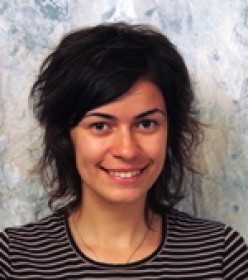Student Talks
Robot Motion for Seamless Human-Robot Collaboration
Event Location: GHC 8102Abstract: The goal of this thesis is to enable robots to produce motion that is suitable for human-robot collaboration and co-existence. Most motion in robotics is purely functional: industrial robots move to package parts, vacuuming robots move to suck dust, and personal robots move to clean up a dirty table. This type [...]
Interactive Learning for Sequential Decisions and Predictions
Event Location: NSH 1305Abstract: Sequential prediction problems arise commonly in many areas of robotics and information processing: e.g., predicting a sequence of actions over time to achieve a goal in a control task, interpreting an image through a sequence of local image patch classifications, or translating speech to text through an iterative decoding procedure. Learning [...]
Inference Machines: Parsing Scenes via Iterated Predictions
Event Location: NSH 1305Abstract: Extracting a rich representation of an environment from visual sensor readings can benefit many tasks in robotics, e.g., path planning, mapping, and object manipulation. While important progress has been made, it remains a difficult problem to effectively parse entire scenes, i.e., to recognize semantic objects, man-made structures, and landforms. This process [...]
Detecting Object Instances Without Discriminative Features
Event Location: NSH 1305Abstract: In this thesis, we study the topic of detecting object instances which lack discriminative features in scenes with severe clutter and occlusions. Our work focuses on the three key areas: (1) objects that have ambiguous features, (2) objects where discriminative point-based features cannot be reliably extracted, and (3) occlusions. Current approaches [...]
Physics-Based Manipulation Planning in Cluttered Human Environments
Event Location: NSH 1305Abstract: This thesis presents a series of planners and algorithms for manipulation in cluttered human environments. The focus is on using physics-based predictions, particularly for pushing operations, as an effective way to address the manipulation challenges posed by these environments. We introduce push-grasping, a physics-based action to grasp an object first by pushing it and [...]
Representation, Planning, and Learning of Dynamic Ad Hoc Robot Teams
Event Location: GHC 8102Abstract: Forming an effective multi-robot team to perform a task is a key problem in many domains. The performance of a multi-robot team depends on the robots the team is composed of, where each robot has different capabilities. Team performance has previously been modeled as the sum of single-robot capabilities, and these [...]
Data-Driven Geometric Scene Understanding
Event Location: NSH 1305Abstract: In this thesis, we describe a data-driven approach to leverage repositories of 3D models for scene understanding. Our ability to relate what we see in an image to a large collection of 3D models allows us to transfer information from these models, creating a rich understanding of the scene. We develop [...]
Towards Autonomous Control of Snake Robots
Event Location: NSH 1305Abstract: Snake robots are ideally suited to highly confined environments because their small cross-sections and highly redundant kinematics allow them to enter and move through tight spaces with a high degree of dexterity. Despite these theoretical advantages, snake robots also pose a number of practical challenges that have limited their usefulness in [...]
Shape for Contact
Event Location: NSH 1305Abstract: Given a desired function for an effector, what is its appropriate shape? This thesis addresses the problem of designing the shape of a rigid end effector to perform a given manipulation task. It presents three main contributions: First, it describes the kinematics of an effector as the combination of both its [...]








